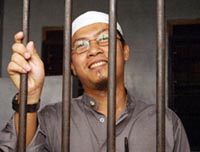7 Indonesians await verdicts in killings of 2 Americans at US-owned gold mine
An Indonesian court was set to issue verdicts Tuesday for seven men accused of killing two American teachers at a U.S.-owned gold mine in Papua province, despite their refusal to defend themselves during the five-month trial.

Prosecutors alleged the men all indigenous Papuans were members of a small rebel army fighting for a separate state in the resource-rich province.
They are accused of shooting Rickey Lynn Spier, 44, of Littleton, Colorado, and Leon Edwin Burgon, 71, of Sun River, Oregon, in 2002 as their car headed down a road toward the mine owned by Freeport-McMoRan Copper and Gold Mine Inc.
Prosecutors have demanded between eight and 20 years in prison for the men, who issued no defense plea, claiming their trial was unfair.
"We haven't been able to meet with our clients in jail for the last month," said Johnson Panjaitan, one of their lawyers, predicting a guilty verdict. "Can you imagine that a client cannot communicate with his lawyer?"
Officials at the heavily-guarded Central Jakarta District Court were not available to comment on the allegations.
The attack originally complicated ties between Washington and Jakarta amid suspicions that Indonesian security forces guarding the mine were involved. But an FBI investigation found no evidence linking soldiers or police to the killings.
Antonius Wamang indicted by a U.S. grand jury in 2004 for the murders acknowledged being a Papuan separatist and said shot at the convoy because be thought it was carrying soldiers, Panjaitan said.
But the other men, accused of providing logistics for the attack, maintain they were innocent civilians.
"We had nothing to do with these shootings," said Ishak Onawame, 54, as he was brought in handcuffs to the court's detainment house. "Our trial has been manipulated for the interests of two countries, Indonesia and the United States."
Dozens of Papuan student protesters gathered outside, chanting "Release them! Release them!"
Washington earlier said Indonesian cooperation with the FBI probe into the killings was a condition last year of restoring military contacts with Jakarta frozen since 1999 due to human rights concerns, reports AP.
Many in Washington were keen to re-engage with the military, which they see as vital in the country's fight against al-Qaida-linked Islamic militants.
Subscribe to Pravda.Ru Telegram channel, Facebook, RSS!


